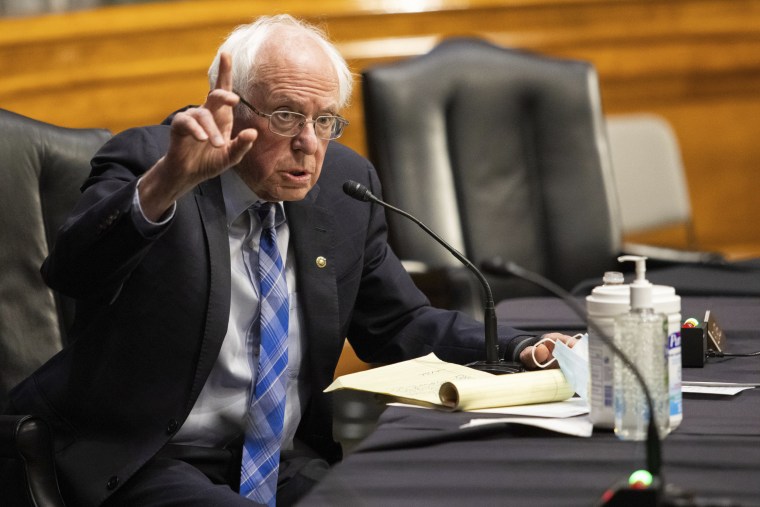WASHINGTON — Democrats considering a maneuver to forgo bipartisan support to pass Covid-19 relief are confronting an unintended consequence: Doing so could automatically cut Medicare.
Many Democrats want to pass President Joe Biden's $1.9 trillion Covid-19 relief proposal, which includes $1,400 stimulus checks and aid to local governments. A group of Republican senators is pushing for a smaller plan that would provide $1,000 checks.
So Democratic leaders are preparing to use a process known as budget reconciliation, which would allow them to pass Biden's proposal without getting 60 votes in the Senate, which would require at least 10 Republicans.
But under the Pay-As-You-Go Act of 2010, known as PAYGO, new laws that raise the national debt automatically trigger offsetting cuts in some safety net programs.
The cuts can be avoided, budget experts say, only with 60 Senate votes — leaving Democrats back where they started, because it's unclear whether Republicans would vote to prevent the cuts after having opposed a partisan relief package.
"It's Medicare. It's farm subsidies," said Marc Goldwein, a budget expert at the nonpartisan Committee for a Responsible Federal Budget. "It's a bunch of programs that would be cut."
The size of the reductions in Medicare and other social safety net program would depend on the size of the package, but they'd be significant even if the price tag fell under $1 trillion. Social Security and low-income programs would be exempt.
"The cuts would be huge," said Paul Van de Water, a senior fellow at the Center on Budget and Policy Priorities, a liberal think tank. "It's a critical issue, which, at some point, is going to have to be dealt with."
Senate Budget Committee Chairman Bernie Sanders, I-Vt., who will shepherd the reconciliation process and has been a supporter of expanding safety net programs, will work to prevent the cuts, said his spokesman, Keane Bhatt.
Bhatt pointed to the last time budget reconciliation was used to make a big change — when Republicans passed a costly tax cut on a partisan vote, which triggered $25 billion in Medicare cuts. But Democrats joined Republicans to prevent the cuts from taking effect in a government funding measure that was passed subsequently.
"Trump and his Republican colleagues used deficit spending to pass $2 trillion in tax breaks overwhelmingly benefiting the wealthiest and large corporations and expanding a military budget with a Pentagon that has never been independently audited," Bhatt said. "When it comes to feeding children who are hungry or treating people who are sick in the middle of a pandemic, funding cuts due to supposed concerns over the deficit would be unacceptable and immoral."
There may be other ways to stop the cuts, but they'd be difficult in practice, Van de Water said.
Download the NBC News app for breaking news and politics
Congress could declare the relief bill an emergency measure, which would exempt it from PAYGO — but adding such a provision would be likely to take 60 votes. Lawmakers could try to use a future reconciliation bill to shut off the automatic cuts, but that would create a cascading effect of, in essence, borrowing from the future, he said.
Congress would have until the end of 2021 to prevent the cuts, and it could do so in any bill under the regular process, said Bill Dauster, who was a policy aide when Harry Reid of Nevada was the to Senate Democratic leader.
"All of God's children should want to avoid a sequester in Medicare and other entitlements," he said. "There are reasonable incentives to want to avoid it again this year."
House Speaker Nancy Pelosi, D-Calif., and Senate Majority Leader Chuck Schumer, D-N.Y., introduced a budget measure Monday that would lay the groundwork to use reconciliation. They said it doesn't preclude a bipartisan package.
"The only thing we cannot accept is a package that is too small or too narrow to pull our country out of this emergency," Schumer said. "We cannot repeat the mistake of 2009."
Alternatively, Democrats could negate the automatic cuts if they raise taxes to prevent adding to the debt or abolish the filibuster, another political can of worms.
Goldwein said forcing Congress to worry about the debt was the purpose of the 2010 law.
"It's supposed to be an obstacle," he said. "The point of statutory PAYGO is to encourage policymakers to pay for things so they don't make the debt worse."

